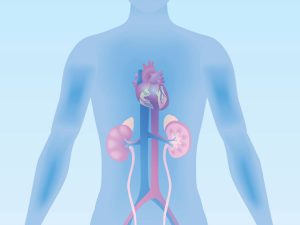To one extent or another, all the body’s organs are interdependent. The function of one organ relies to at least some degree on the ability of all the other organs do their jobs. This interdependency is particularly striking between the heart and the kidneys.
 How heart and kidney anatomy are connected
How heart and kidney anatomy are connected
This interdependency is shown by the fact that the kidneys receive about 20% of the total cardiac output, i.e. roughly 1 litre per minute. This is quite surprising since the kidneys are small (150g) organs.
But as both organs are responsible for maintaining the blood pressure (BP) – which is vital to the normal functioning of all organs (including the brain) – perhaps it is not so surprising.
But the link is not just the heart and the kidneys.
In a number of kidney diseases there is leakage of protein. But this is also a hallmark of heart disease. And the commonest known underlying driver of kidney and heart disease worldwide is diabetes. So it is this triangle of diabetes, the kidney and heart, that demonstrates the link between these organs.
So. Why do heart and kidney disease go together (cardiorenal syndrome)?
Heart disease and kidney disease often go together. There are at least five clinical circumstances in which cardiac disease and renal disease tend to occur together:
- Acute episodes of heart failure can cause recurrent Acute Kidney Injury (AKI), that can lead to permanent damage (CKD). And the opposite is true, i.e rapidly deteriorating kidney function (AKI) can cause acute heart failure
- Chronic heart failure (CHF) over a prolonged period often leads to chronic kidney disease (CKD), and vice versa
- The underlying pathology of many people with CKD and CHF is the same, i.e. atheroma (in the coronary and renal arteries). And this can be driven by the same risk factors (e.g. diabetes and smoking)
- Chronic kidney disease is a strong risk factor for ischaemic disease (IHD), chronic heart failure, and cardiac arrhythmias
- Several medical problems that can affect multiple organ systems, such as diabetes or lupus, often produce disease of both the heart and kidneys.
So, if either the heart or the kidneys are affected by some form of the disease, there is a significant risk that the other organ will also develop medical problems. This general relationship between heart and kidney disease has sometimes been called the ‘cardiorenal syndrome’ (CRS).
The many ways in which heart disease can lead to kidney disease, and vice versa, are not yet completely understood. However, in recent years, our understanding of this relationship has advanced greatly; helping us develop treatments that work for both conditions.
How does heart disease cause kidney problems?
Heart failure is a clinical condition that can result from almost any form of heart disease, so it is very common. And kidney disease is one of the many problems caused by heart failure. There are several ways in which heart failure can lead to kidney disease. The main ones are:
Drop in cardiac output
In chronic heart failure (CHF), the amount of blood that the heart can pump may become reduced. This decrease in blood flow can reduce the volume of blood being filtered by the kidneys, which causes kidney function to deteriorate. In other words the blood supply to all organs goes down in CHF, including the 20% that goes to the kidneys.
Hormonal changes
To compensate for the drop in cardiac output that often occurs in heart failure, a number of changes occur in the hormones that control both the volume of salt and water in the blood, and blood pressure (BP) – that is, in the renin-angiotensin-aldosterone system (RAS).
These hormonal changes cause the body to retain salt and water. In the short term, water and sodium retention can improve the amount of blood reaching other vital organs. The body is trying to keep the blood pressure up, and so maintain blood supply to the brain.
However, in the long term, these changes lead to oedema (swelling) and to even further reduction in the cardiac output. So, chronically, these changes result in a further reduction of blood flow to the kidneys, and kidney function deteriorates even more.
Summary
We have described why heart and kidney disease go together, as the cardiorenal syndrome. We hope you have found it helpful.
Last Reviewed on 23 August 2023
